IT Ethics: Analyzing App Data Access Without User Consent - Case Study
VerifiedAdded on 2022/10/10
|7
|1643
|344
Essay
AI Summary
This essay delves into the ethical implications of applications accessing user data without consent, a critical issue in the rapidly evolving field of Information Technology. The paper analyzes the ethical concerns surrounding data privacy and security, particularly focusing on the Path application as a case study. It applies classical ethical theories such as utilitarianism, deontology, social contract theory, and virtue ethics to evaluate the moral and legal implications of such practices. The essay argues that accessing data without user consent is unethical and potentially illegal, highlighting the importance of encryption, transparency, and user control over personal information. It stresses the responsibilities of app developers and app stores in protecting user privacy, advocating for measures like informed consent, data security protocols, and adherence to IT professional conduct codes to maintain ethical standards and build user trust. The conclusion emphasizes the need for a comprehensive evaluation of IT systems before public release, ensuring that user privacy and security are prioritized. The essay reinforces that ethical IT practices are essential for the responsible use and development of technology.
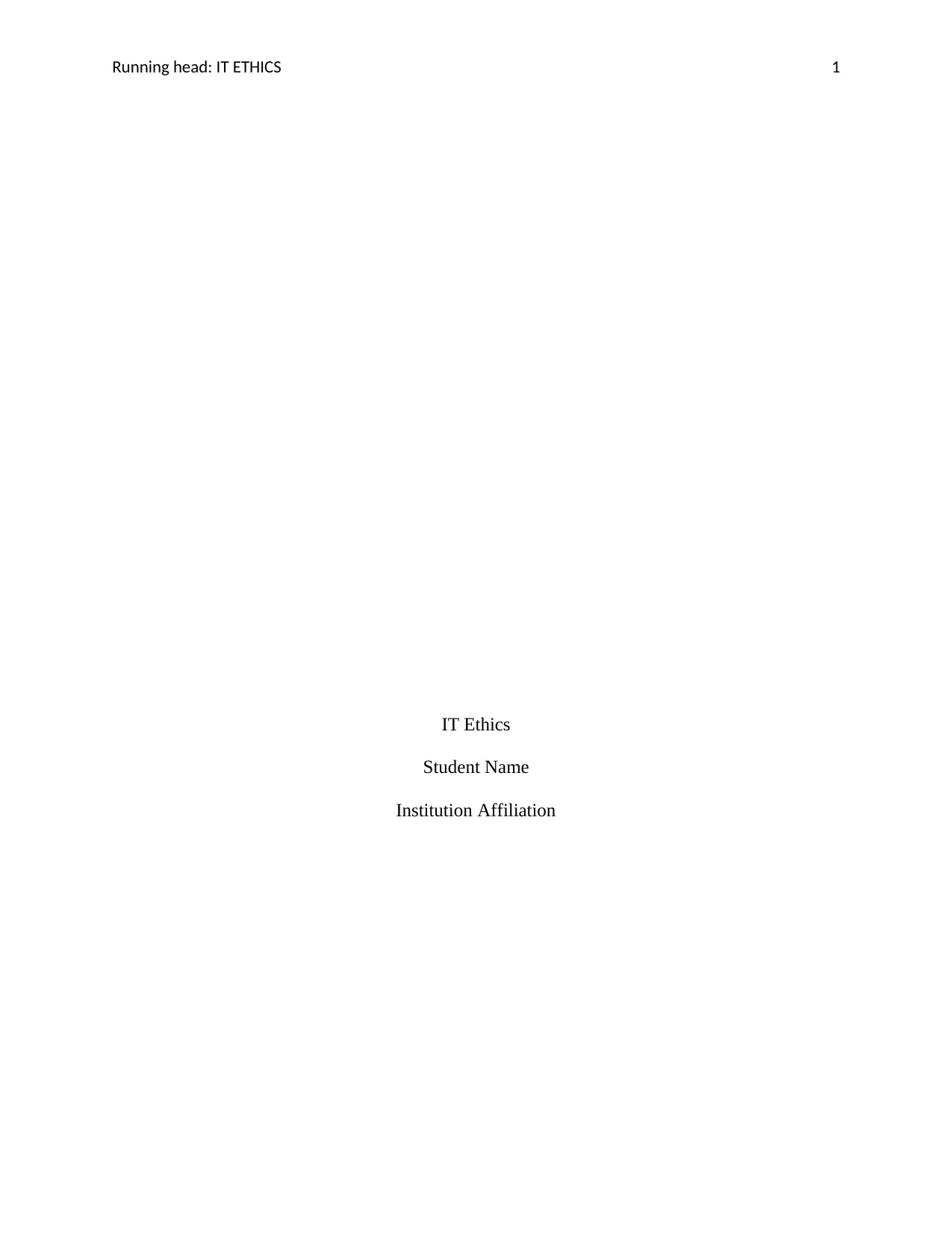
Running head: IT ETHICS 1
IT Ethics
Student Name
Institution Affiliation
IT Ethics
Student Name
Institution Affiliation
Paraphrase This Document
Need a fresh take? Get an instant paraphrase of this document with our AI Paraphraser
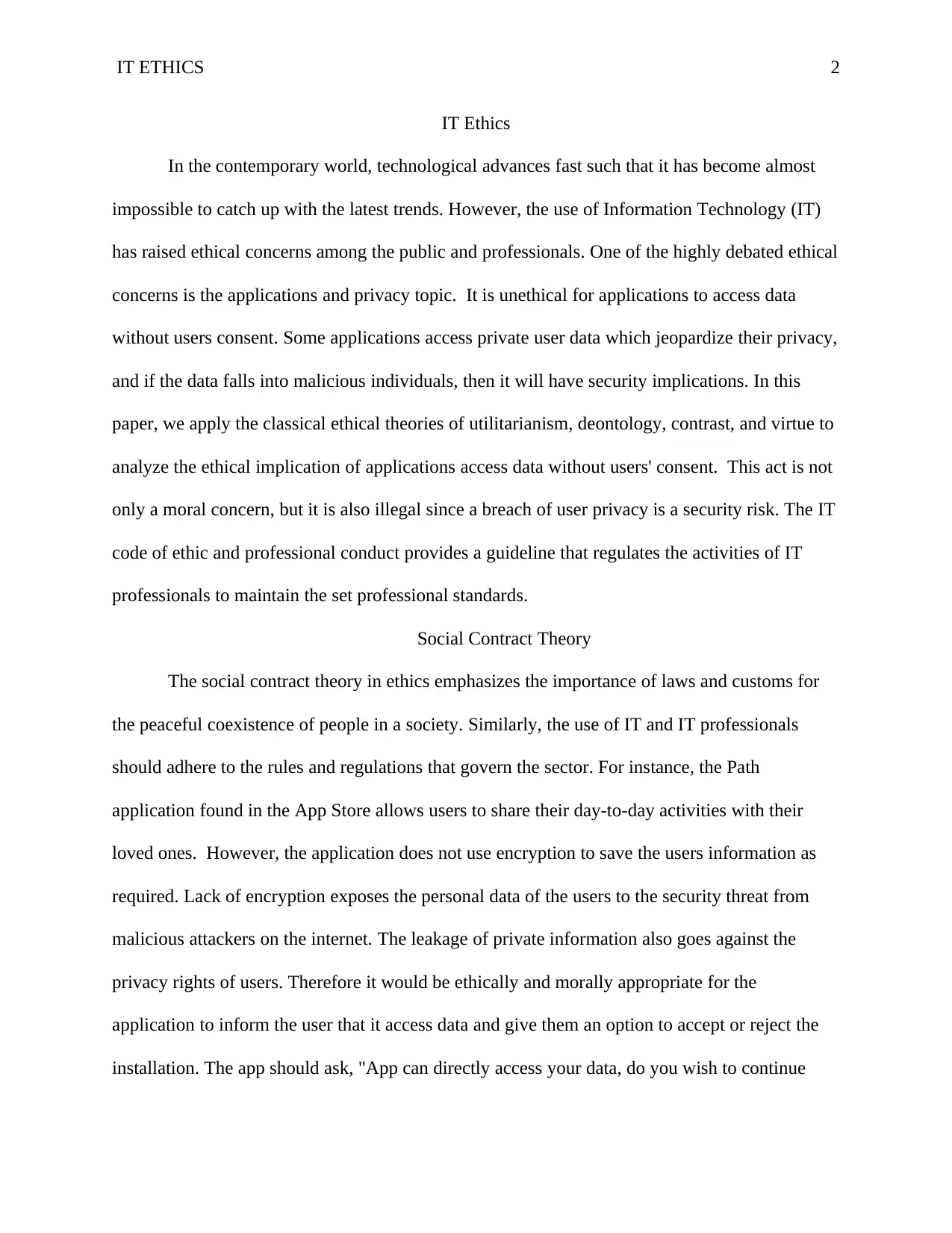
IT ETHICS 2
IT Ethics
In the contemporary world, technological advances fast such that it has become almost
impossible to catch up with the latest trends. However, the use of Information Technology (IT)
has raised ethical concerns among the public and professionals. One of the highly debated ethical
concerns is the applications and privacy topic. It is unethical for applications to access data
without users consent. Some applications access private user data which jeopardize their privacy,
and if the data falls into malicious individuals, then it will have security implications. In this
paper, we apply the classical ethical theories of utilitarianism, deontology, contrast, and virtue to
analyze the ethical implication of applications access data without users' consent. This act is not
only a moral concern, but it is also illegal since a breach of user privacy is a security risk. The IT
code of ethic and professional conduct provides a guideline that regulates the activities of IT
professionals to maintain the set professional standards.
Social Contract Theory
The social contract theory in ethics emphasizes the importance of laws and customs for
the peaceful coexistence of people in a society. Similarly, the use of IT and IT professionals
should adhere to the rules and regulations that govern the sector. For instance, the Path
application found in the App Store allows users to share their day-to-day activities with their
loved ones. However, the application does not use encryption to save the users information as
required. Lack of encryption exposes the personal data of the users to the security threat from
malicious attackers on the internet. The leakage of private information also goes against the
privacy rights of users. Therefore it would be ethically and morally appropriate for the
application to inform the user that it access data and give them an option to accept or reject the
installation. The app should ask, "App can directly access your data, do you wish to continue
IT Ethics
In the contemporary world, technological advances fast such that it has become almost
impossible to catch up with the latest trends. However, the use of Information Technology (IT)
has raised ethical concerns among the public and professionals. One of the highly debated ethical
concerns is the applications and privacy topic. It is unethical for applications to access data
without users consent. Some applications access private user data which jeopardize their privacy,
and if the data falls into malicious individuals, then it will have security implications. In this
paper, we apply the classical ethical theories of utilitarianism, deontology, contrast, and virtue to
analyze the ethical implication of applications access data without users' consent. This act is not
only a moral concern, but it is also illegal since a breach of user privacy is a security risk. The IT
code of ethic and professional conduct provides a guideline that regulates the activities of IT
professionals to maintain the set professional standards.
Social Contract Theory
The social contract theory in ethics emphasizes the importance of laws and customs for
the peaceful coexistence of people in a society. Similarly, the use of IT and IT professionals
should adhere to the rules and regulations that govern the sector. For instance, the Path
application found in the App Store allows users to share their day-to-day activities with their
loved ones. However, the application does not use encryption to save the users information as
required. Lack of encryption exposes the personal data of the users to the security threat from
malicious attackers on the internet. The leakage of private information also goes against the
privacy rights of users. Therefore it would be ethically and morally appropriate for the
application to inform the user that it access data and give them an option to accept or reject the
installation. The app should ask, "App can directly access your data, do you wish to continue
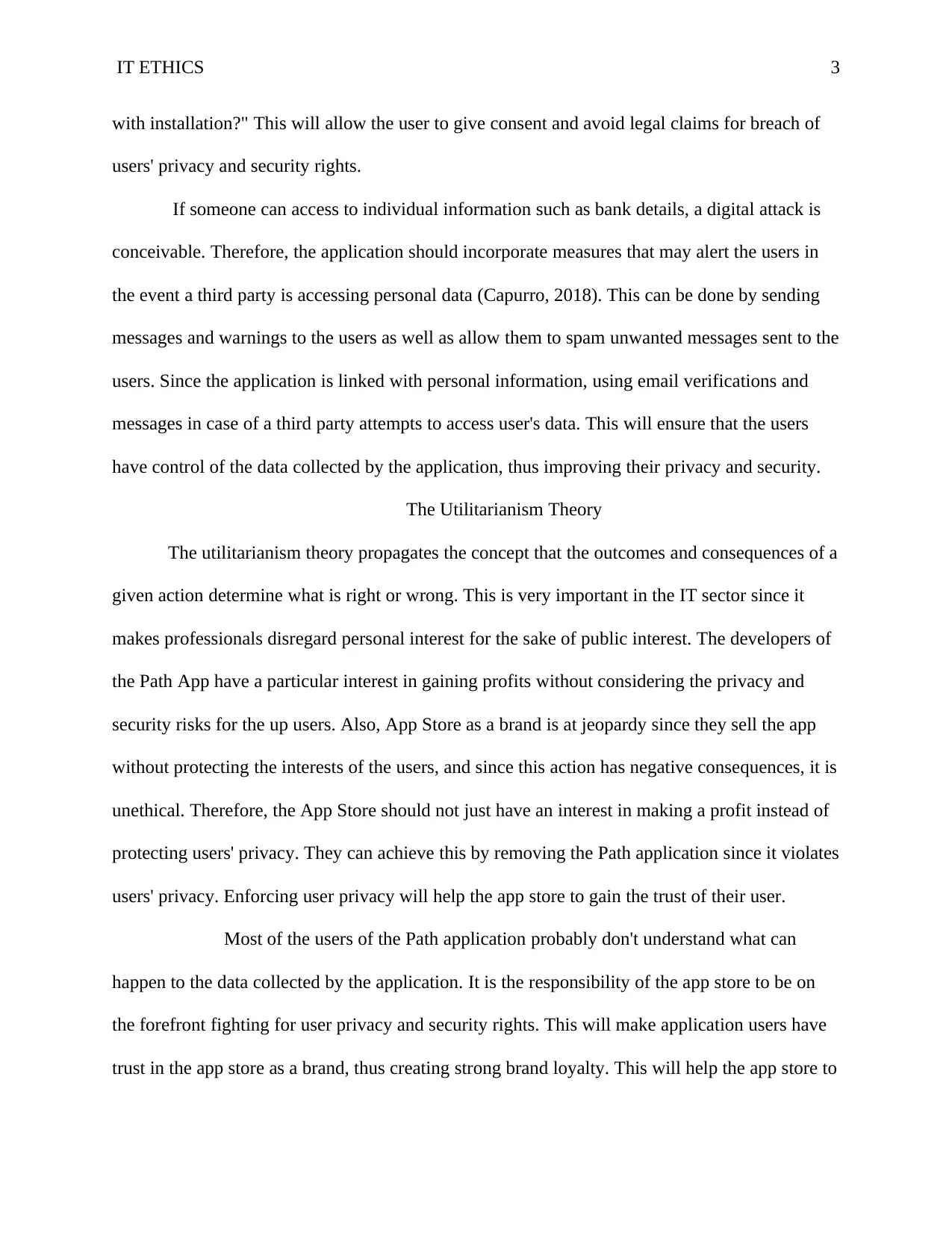
IT ETHICS 3
with installation?" This will allow the user to give consent and avoid legal claims for breach of
users' privacy and security rights.
If someone can access to individual information such as bank details, a digital attack is
conceivable. Therefore, the application should incorporate measures that may alert the users in
the event a third party is accessing personal data (Capurro, 2018). This can be done by sending
messages and warnings to the users as well as allow them to spam unwanted messages sent to the
users. Since the application is linked with personal information, using email verifications and
messages in case of a third party attempts to access user's data. This will ensure that the users
have control of the data collected by the application, thus improving their privacy and security.
The Utilitarianism Theory
The utilitarianism theory propagates the concept that the outcomes and consequences of a
given action determine what is right or wrong. This is very important in the IT sector since it
makes professionals disregard personal interest for the sake of public interest. The developers of
the Path App have a particular interest in gaining profits without considering the privacy and
security risks for the up users. Also, App Store as a brand is at jeopardy since they sell the app
without protecting the interests of the users, and since this action has negative consequences, it is
unethical. Therefore, the App Store should not just have an interest in making a profit instead of
protecting users' privacy. They can achieve this by removing the Path application since it violates
users' privacy. Enforcing user privacy will help the app store to gain the trust of their user.
Most of the users of the Path application probably don't understand what can
happen to the data collected by the application. It is the responsibility of the app store to be on
the forefront fighting for user privacy and security rights. This will make application users have
trust in the app store as a brand, thus creating strong brand loyalty. This will help the app store to
with installation?" This will allow the user to give consent and avoid legal claims for breach of
users' privacy and security rights.
If someone can access to individual information such as bank details, a digital attack is
conceivable. Therefore, the application should incorporate measures that may alert the users in
the event a third party is accessing personal data (Capurro, 2018). This can be done by sending
messages and warnings to the users as well as allow them to spam unwanted messages sent to the
users. Since the application is linked with personal information, using email verifications and
messages in case of a third party attempts to access user's data. This will ensure that the users
have control of the data collected by the application, thus improving their privacy and security.
The Utilitarianism Theory
The utilitarianism theory propagates the concept that the outcomes and consequences of a
given action determine what is right or wrong. This is very important in the IT sector since it
makes professionals disregard personal interest for the sake of public interest. The developers of
the Path App have a particular interest in gaining profits without considering the privacy and
security risks for the up users. Also, App Store as a brand is at jeopardy since they sell the app
without protecting the interests of the users, and since this action has negative consequences, it is
unethical. Therefore, the App Store should not just have an interest in making a profit instead of
protecting users' privacy. They can achieve this by removing the Path application since it violates
users' privacy. Enforcing user privacy will help the app store to gain the trust of their user.
Most of the users of the Path application probably don't understand what can
happen to the data collected by the application. It is the responsibility of the app store to be on
the forefront fighting for user privacy and security rights. This will make application users have
trust in the app store as a brand, thus creating strong brand loyalty. This will help the app store to
⊘ This is a preview!⊘
Do you want full access?
Subscribe today to unlock all pages.

Trusted by 1+ million students worldwide
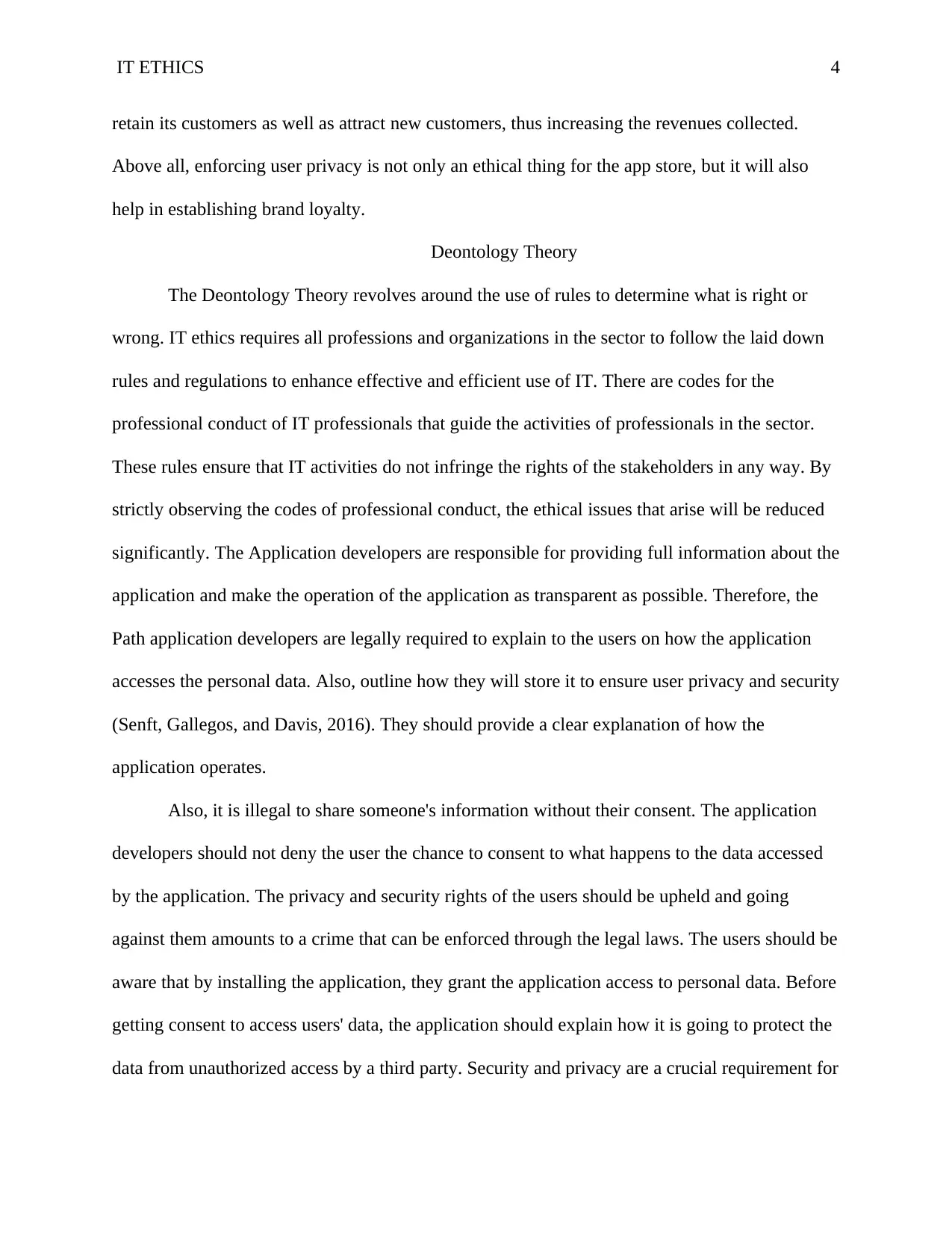
IT ETHICS 4
retain its customers as well as attract new customers, thus increasing the revenues collected.
Above all, enforcing user privacy is not only an ethical thing for the app store, but it will also
help in establishing brand loyalty.
Deontology Theory
The Deontology Theory revolves around the use of rules to determine what is right or
wrong. IT ethics requires all professions and organizations in the sector to follow the laid down
rules and regulations to enhance effective and efficient use of IT. There are codes for the
professional conduct of IT professionals that guide the activities of professionals in the sector.
These rules ensure that IT activities do not infringe the rights of the stakeholders in any way. By
strictly observing the codes of professional conduct, the ethical issues that arise will be reduced
significantly. The Application developers are responsible for providing full information about the
application and make the operation of the application as transparent as possible. Therefore, the
Path application developers are legally required to explain to the users on how the application
accesses the personal data. Also, outline how they will store it to ensure user privacy and security
(Senft, Gallegos, and Davis, 2016). They should provide a clear explanation of how the
application operates.
Also, it is illegal to share someone's information without their consent. The application
developers should not deny the user the chance to consent to what happens to the data accessed
by the application. The privacy and security rights of the users should be upheld and going
against them amounts to a crime that can be enforced through the legal laws. The users should be
aware that by installing the application, they grant the application access to personal data. Before
getting consent to access users' data, the application should explain how it is going to protect the
data from unauthorized access by a third party. Security and privacy are a crucial requirement for
retain its customers as well as attract new customers, thus increasing the revenues collected.
Above all, enforcing user privacy is not only an ethical thing for the app store, but it will also
help in establishing brand loyalty.
Deontology Theory
The Deontology Theory revolves around the use of rules to determine what is right or
wrong. IT ethics requires all professions and organizations in the sector to follow the laid down
rules and regulations to enhance effective and efficient use of IT. There are codes for the
professional conduct of IT professionals that guide the activities of professionals in the sector.
These rules ensure that IT activities do not infringe the rights of the stakeholders in any way. By
strictly observing the codes of professional conduct, the ethical issues that arise will be reduced
significantly. The Application developers are responsible for providing full information about the
application and make the operation of the application as transparent as possible. Therefore, the
Path application developers are legally required to explain to the users on how the application
accesses the personal data. Also, outline how they will store it to ensure user privacy and security
(Senft, Gallegos, and Davis, 2016). They should provide a clear explanation of how the
application operates.
Also, it is illegal to share someone's information without their consent. The application
developers should not deny the user the chance to consent to what happens to the data accessed
by the application. The privacy and security rights of the users should be upheld and going
against them amounts to a crime that can be enforced through the legal laws. The users should be
aware that by installing the application, they grant the application access to personal data. Before
getting consent to access users' data, the application should explain how it is going to protect the
data from unauthorized access by a third party. Security and privacy are a crucial requirement for
Paraphrase This Document
Need a fresh take? Get an instant paraphrase of this document with our AI Paraphraser
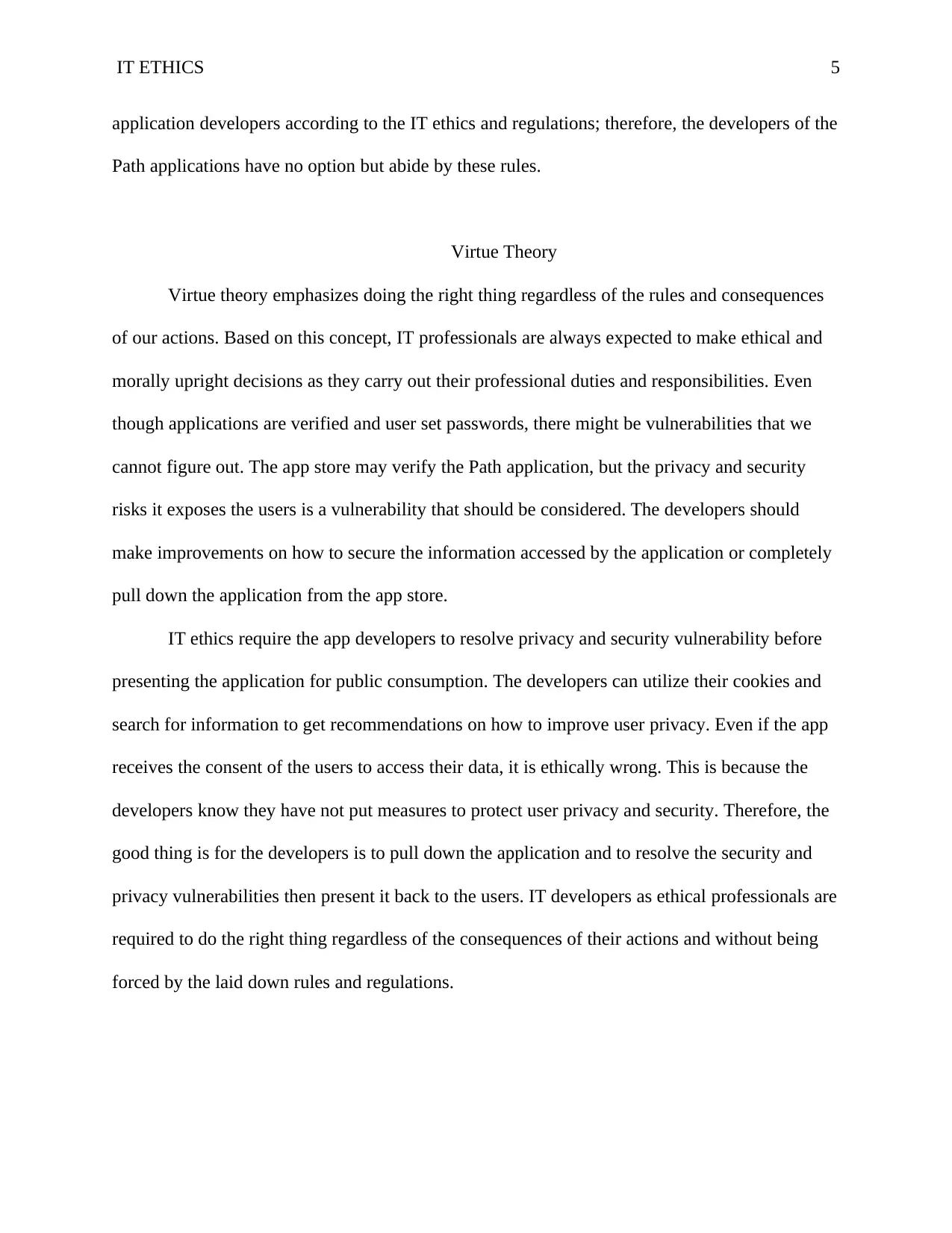
IT ETHICS 5
application developers according to the IT ethics and regulations; therefore, the developers of the
Path applications have no option but abide by these rules.
Virtue Theory
Virtue theory emphasizes doing the right thing regardless of the rules and consequences
of our actions. Based on this concept, IT professionals are always expected to make ethical and
morally upright decisions as they carry out their professional duties and responsibilities. Even
though applications are verified and user set passwords, there might be vulnerabilities that we
cannot figure out. The app store may verify the Path application, but the privacy and security
risks it exposes the users is a vulnerability that should be considered. The developers should
make improvements on how to secure the information accessed by the application or completely
pull down the application from the app store.
IT ethics require the app developers to resolve privacy and security vulnerability before
presenting the application for public consumption. The developers can utilize their cookies and
search for information to get recommendations on how to improve user privacy. Even if the app
receives the consent of the users to access their data, it is ethically wrong. This is because the
developers know they have not put measures to protect user privacy and security. Therefore, the
good thing is for the developers is to pull down the application and to resolve the security and
privacy vulnerabilities then present it back to the users. IT developers as ethical professionals are
required to do the right thing regardless of the consequences of their actions and without being
forced by the laid down rules and regulations.
application developers according to the IT ethics and regulations; therefore, the developers of the
Path applications have no option but abide by these rules.
Virtue Theory
Virtue theory emphasizes doing the right thing regardless of the rules and consequences
of our actions. Based on this concept, IT professionals are always expected to make ethical and
morally upright decisions as they carry out their professional duties and responsibilities. Even
though applications are verified and user set passwords, there might be vulnerabilities that we
cannot figure out. The app store may verify the Path application, but the privacy and security
risks it exposes the users is a vulnerability that should be considered. The developers should
make improvements on how to secure the information accessed by the application or completely
pull down the application from the app store.
IT ethics require the app developers to resolve privacy and security vulnerability before
presenting the application for public consumption. The developers can utilize their cookies and
search for information to get recommendations on how to improve user privacy. Even if the app
receives the consent of the users to access their data, it is ethically wrong. This is because the
developers know they have not put measures to protect user privacy and security. Therefore, the
good thing is for the developers is to pull down the application and to resolve the security and
privacy vulnerabilities then present it back to the users. IT developers as ethical professionals are
required to do the right thing regardless of the consequences of their actions and without being
forced by the laid down rules and regulations.
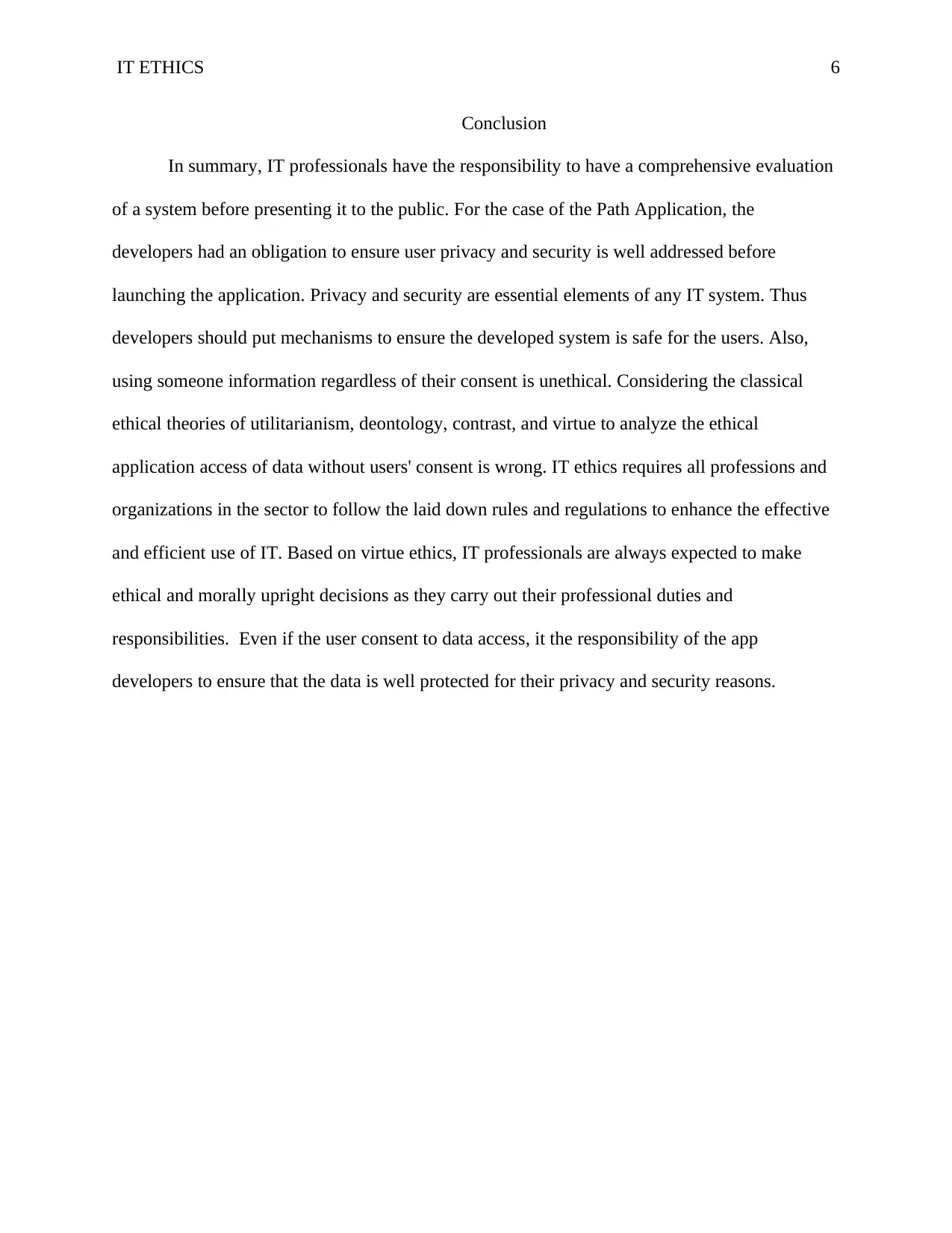
IT ETHICS 6
Conclusion
In summary, IT professionals have the responsibility to have a comprehensive evaluation
of a system before presenting it to the public. For the case of the Path Application, the
developers had an obligation to ensure user privacy and security is well addressed before
launching the application. Privacy and security are essential elements of any IT system. Thus
developers should put mechanisms to ensure the developed system is safe for the users. Also,
using someone information regardless of their consent is unethical. Considering the classical
ethical theories of utilitarianism, deontology, contrast, and virtue to analyze the ethical
application access of data without users' consent is wrong. IT ethics requires all professions and
organizations in the sector to follow the laid down rules and regulations to enhance the effective
and efficient use of IT. Based on virtue ethics, IT professionals are always expected to make
ethical and morally upright decisions as they carry out their professional duties and
responsibilities. Even if the user consent to data access, it the responsibility of the app
developers to ensure that the data is well protected for their privacy and security reasons.
Conclusion
In summary, IT professionals have the responsibility to have a comprehensive evaluation
of a system before presenting it to the public. For the case of the Path Application, the
developers had an obligation to ensure user privacy and security is well addressed before
launching the application. Privacy and security are essential elements of any IT system. Thus
developers should put mechanisms to ensure the developed system is safe for the users. Also,
using someone information regardless of their consent is unethical. Considering the classical
ethical theories of utilitarianism, deontology, contrast, and virtue to analyze the ethical
application access of data without users' consent is wrong. IT ethics requires all professions and
organizations in the sector to follow the laid down rules and regulations to enhance the effective
and efficient use of IT. Based on virtue ethics, IT professionals are always expected to make
ethical and morally upright decisions as they carry out their professional duties and
responsibilities. Even if the user consent to data access, it the responsibility of the app
developers to ensure that the data is well protected for their privacy and security reasons.
⊘ This is a preview!⊘
Do you want full access?
Subscribe today to unlock all pages.

Trusted by 1+ million students worldwide
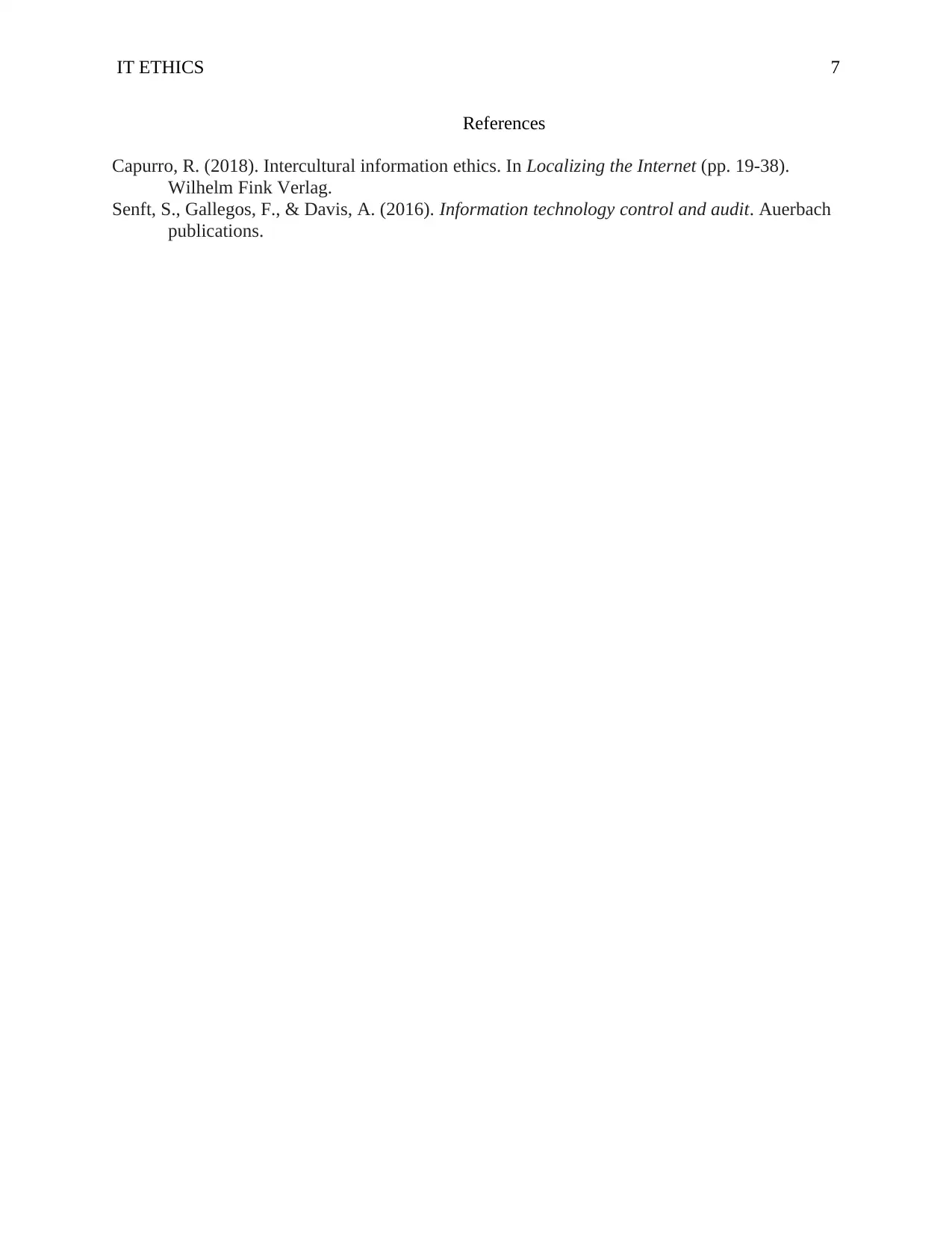
IT ETHICS 7
References
Capurro, R. (2018). Intercultural information ethics. In Localizing the Internet (pp. 19-38).
Wilhelm Fink Verlag.
Senft, S., Gallegos, F., & Davis, A. (2016). Information technology control and audit. Auerbach
publications.
References
Capurro, R. (2018). Intercultural information ethics. In Localizing the Internet (pp. 19-38).
Wilhelm Fink Verlag.
Senft, S., Gallegos, F., & Davis, A. (2016). Information technology control and audit. Auerbach
publications.
1 out of 7
Related Documents
Your All-in-One AI-Powered Toolkit for Academic Success.
+13062052269
info@desklib.com
Available 24*7 on WhatsApp / Email
![[object Object]](/_next/static/media/star-bottom.7253800d.svg)
Unlock your academic potential
Copyright © 2020–2026 A2Z Services. All Rights Reserved. Developed and managed by ZUCOL.





